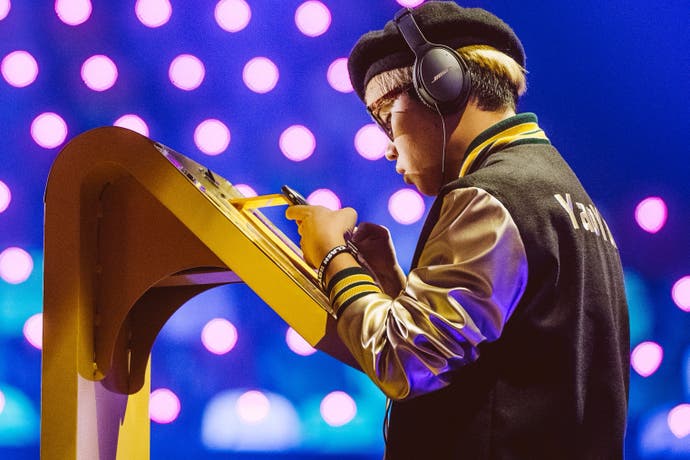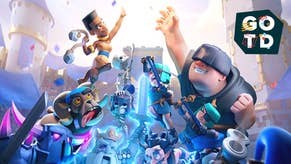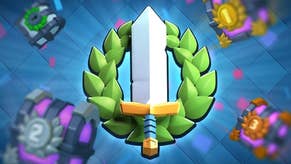My new gaming heroes are a pharmacist, a classical pianist, and a guy who really loves Jumanji
Crowning around.
Hackney Wick is the best station for the Queen Elizabeth Olympic Park, and so I emerged from the carriage last Sunday amongst what seemed like a disproportionate number of people wearing running shoes and tracksuits and fiddling with Fitbits. Once I had left the station, though, and made the first few turns towards the Copper Box, a sporting arena that has hosted everything from Wheelchair Rugby to the Netball Superleague, I was walking amongst a different crowd.
Rucksacks jangled with electronics and crackled with packets of biscuits. Hands were thrust deep into the pockets of parkas. No talk of PBs; people were chatting about favourite cards, joking about busting apart potential queues with a well-placed Tornado, or Hog-riding over the turnstiles. There were a few groups, a few couples, but nobody really knew each other. We all got the jokes, though. We had all spent the last few years ensuring that we would get the jokes.
Clash Royale is a tower defence game in which two players battle to knock through each other's castles by playing cards that spawn troops, spells and buildings on the grass of a tidy little arena. At the World Finals, which were held at the Copper Box last Sunday, 16 of the planet's best competed for a prize pool of $400,000, with $150,000 going to the winner.
It was all quietly lavish. In the darkened arena, players faced off in a game that was projected onto the ground between them, each commander sat behind their own crown tower. Amidst familiar music stings - the Clash Royale theme is perky and militant, so it always sounds like the six o'clock news is about to begin - and the surprisingly unforced banter of some brilliant shoutcasters, those 16 Clash experts came together to prove that the game I have spent the last few years playing almost every evening is still a game I know pretty much nothing about.
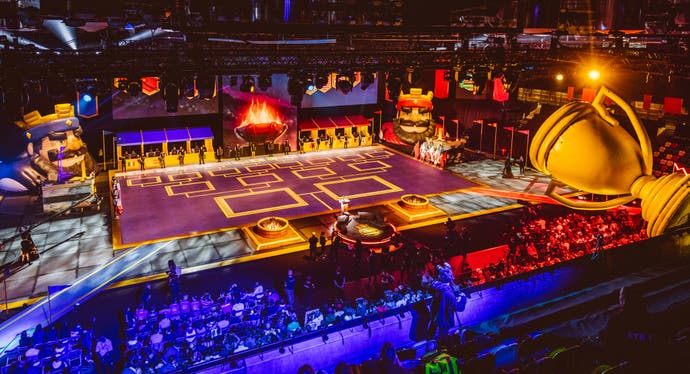
And Clash Royale itself had an excellent Sunday. Stripped of the progression system that sees you grinding for loot boxes or paying for individual cards, and which sees my badly-deployed skeletons chewing through your perfectly-placed Golem simply because I have put more time or money into them - stripped of all that, this is a precise and unforgiving tactical battler. Most of all, it is consistently surprising and exciting. Battles can turn on a single mistake here, on a single unexpected flair move. In my world, Clash Royale is a thing of three-nils or three-ones. Every game is a rout for somebody, generally me. Here, though, it's one-nil all the way, each tower that falls becomes a set-piece, contested ingeniously by players who understand the cost - in every sense - of all their cards and the damage - in every sense - that they will do. These are players who know when to sacrifice tempo on a rocket because they know exactly how long it takes to hit its target and exactly what will happen when it hits. There were a lot of rockets in the air on Sunday, a lot of logs rolling across the earth. Yes! Clash Royale had an excellent Sunday.
But the real stars were the players, and this I was not entirely expecting.
Well, maybe I expected it a little bit. For years I have read Barney Ronay in the Guardian every week, sick with jealousy not just at the effortless Barney Ronayness of his prose but at the things he gets to write about. He gets to write about Football, sure, but he also gets to write about Messi. And when he writes about Messi, and because he is Barney Ronay, he writes that Messi's greatness is his "gentleness," that his dribbles glide, that they are lullabies and that he uses them to lull Bayern "into a drowsy supplication at his feet..."
This, my friends - and here I am quoting our own Barney Ronay - is hardcore. Ronay is writing about football, but he's also writing about character, about a player who is an almost unprecedented presence on the pitch, who does things - the gentleness, the lullabies, the drowsy supplication - that speak of football but also, you know, of character. (Wes has just told me, during an edit, that one of the things that Messi may have glided past is paying his taxes properly.) So I have always thought: esports! Surely esports is a chance to write about games and about character - a chance to write about people!
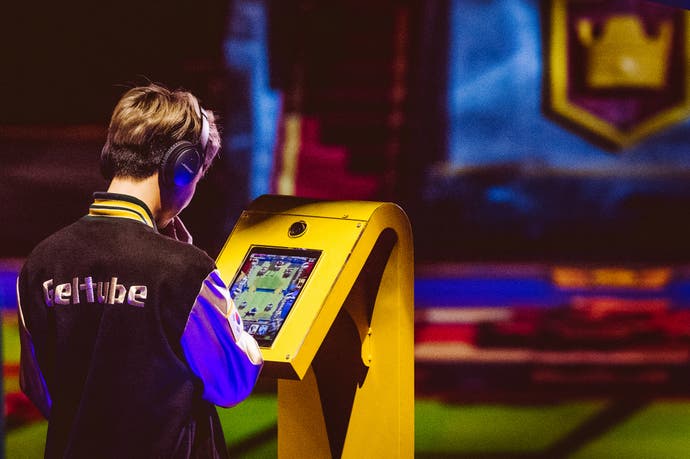
People had a good day on Sunday. So much so that I could barely keep track of them. 16 players, four rounds: eight matches, then four, then two, then one. In every match of those initial eight I discovered I had a new favourite.
First match: MusicMaster is my guy. "Creativity is king!" says a shoutcaster. "MusicMaster is truly a master of music!" He is, too. Piano and violin, I gather, and now he's considered the best Mortar player in the world.
MusicMaster is not expected to do that well. He has not been playing seriously for long enough, apparently, but this perhaps misses the point that, at just 16, MusicMaster has not been doing anything seriously for very long. Even so: MusicMaster (US) is expected to fall to YaoYao (Taiwan) pretty quickly. YaoYao's an esports veteran, although that too seems impossible when I watch these two face off on the screen. Two images of concentration, two sets of headphones, two pairs of eyeglasses, two foreheads shiny with sweat. They are both so young! I miss most of the first game because I am trying to find coffee, but when I return, YaoYao is one game down - a bit of an upset.
The balance in the universe seems to reassert itself with the second game, in which YaoYao whittles MusicMaster's tower down to 242 in extra time and then poisons it into oblivion. "We're not looking to find the second or third best in the world", says a shoutcaster at some point during this match-up. I do not think they are suggesting MusicMaster is not up to it - I do not think they are talking about MusicMaster in particular - but I sense how this is going to go. MusicMaster, who has not been playing Clash for very long, has only very recently told his parents he has been playing it in the first place. He only told them, apparently, when he qualified for a competition in LA and needed to get out to the West Coast.
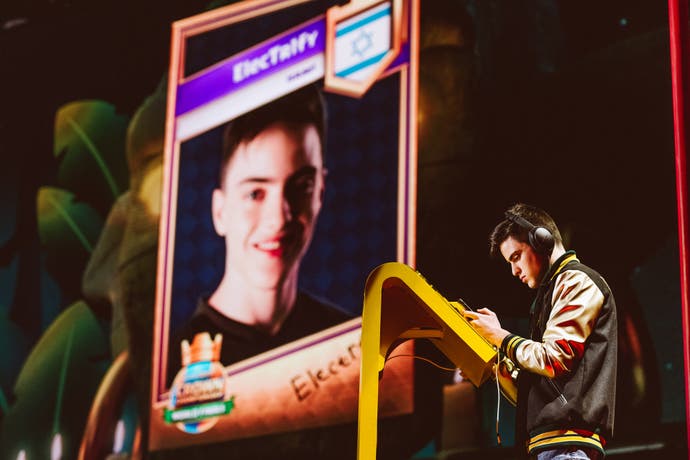
Third game. We are told that YaoYao has made the most money out of any player on the circuit. We are reminded that he's a beast in Southeast Asia, that he's consistent and long-term whereas MusicMaster is possibly a bit too "recent". Even so, that piano and violin background may count for something? MusicMaster says that a knowledge of music helps him predict the flow of the game.
That must be very useful, because MusicMaster's deck in the final game is all over the place: wild and unprecedented, with both Furnace and Golem Hut creating a weird double-spawner set-up. YaoYao loses a tower and then it's over. MusicMaster advances. He was not a favourite, we're told, but it doesn't matter by this point because MusicMaster is suddenly my favourite.
He's my favourite until the next match anyway: Geltube from South Korea versus Adrian Piedra of Mexico. And, oh man, I suddenly fall for Piedra like nobody's business.
Piedra is young, like MusicMaster. Again, everyone's young here, but Piedra's just 18 and Geltube's 27. Enough to make me root for Piedra by itself, but he's also pitched as a happy-go-lucky type and yet today he seems so serious. He is known as the Aztec Eagle. He glowers at the monitor unblinking, lips thin. He looks like a man who is channeling his attention so fiercely that I'm surprised the screen he's staring into doesn't suddenly burst into flames.
He plays Graveyard, a card I love and hate in equal proportion, and he wins his first game pretty easily, I think, the only insight into his mood coming from a little play of his hands in the air as Geltube's tower falls. And then, in between games, I realise that I will never love another player the way I love this ostensibly happy-go-lucky teenager from Mexico. No victory. No nervous smiles. He waves away a hovering technician and then he closes his eyes and keeps them closed. He breathes deeply and theatrically. And I realise: this is what it means to be present. All those holidays I have ruined because I cannot put my phone away. All those evenings I have listlessly sat through Revenge missing crucial plot points because I cannot stop thinking about what I have to do the next morning. Adrian Piedra, the Aztec Eagle, is showing me how to live, how to be so rooted in each moment that you can almost feel him sinking into the ground. Long story short, in the next game, Piedra deploys a Princess - my favourite card, a vicious genius wielding what amounts to a flaming shotgun - and he deploys it so well that he gets a round of applause. "I'd say that Adrian's on fire," says a shoutcaster, "but it's the left-hand tower that's on fire!"
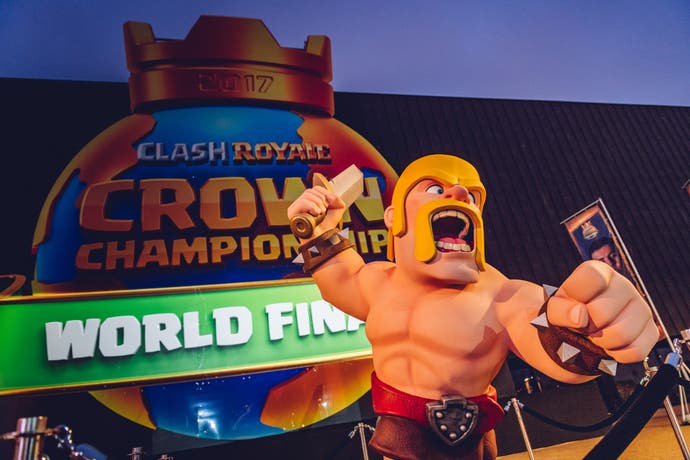
Geltube? Well, from where I am, it looks like Geltube gives up. Piedra wins two-to-nothing, but most of all he wins with that spontaneous round of applause for the way he used the Princess. They call these things brilliancies in Chess - the name for a game so special and with such new stuff in it that it is a gift to the community, a puzzle to be solved. Brilliancies are replayed over and over for years to come, by novices who will shake the game and shake the game again to try and understand how all the pieces of this strange device fit together. "Not since the early days of Super Mario has an intrepid hero saved a princess so well," says a shoutcaster, and he means saved as in held-back. Such restraint! The Aztec Eagle kept that card in the deck until the perfect moment. The perfect moment.
It continues. Not for Piedra, perhaps, who will go out in the round two (and takes it wonderfully well when it happens), but for all the other players, each game introducing someone who turns out to be my new favourite player ever.
Here's one thing I love about Clash Royale: the flavour text. An example at random: Inferno Dragon - "Shoots a focused beam of fire that increases in damage over time. Wears a helmet because flying can be dangerous." Ideal writing: so brisk, so playful. You don't object to the joke because the crucial information gets the lead. You remember the crucial information because the joke is so lightly deployed.
Well, it turns out that these players come with their own flavour text, and most of them seem equally irresistible. Winds from China. He's 24 and works as a pharmacist. It's fitting he works as a pharmacist, right, because his favourite card is Poison. And it's interesting that his favourite card is Poison because in the pre-match bans - each player gets to ban a card and the tactical chat this leads to is yet more proof of what a special game Clash Royale is - he bans Poison. He beats ColtoNW83 from the US, a considerable upset, two to one. All three of these are amazing games, but game two in particular is a real turnaround performance: you never know who's going to win. Even as I recover from that, Adrian Piedra, yet to be defeated in his next match-up, is being interviewed in the player lounge. "I feel amazing," he says, the stern face he presented to the world banished entirely. "The first match is always important." He talks about how a back injury in basketball pushed him towards Clash Royale. He admits that he wasn't that good at first, and that to play well you have to truly enjoy the game. London is so cold, "but now I feel warm." He laughs. His team is called Team Queso. Their logo is a wedge of angry cartoon cheese. Seriously, this game.

The matches continue, and this is still just the first round. I would have liked to have seen more from Fuchi, a Japanese player who is known for craziness and innovation. He and Berin ban some unusual cards: Canon and Ice Golem. "They're not the big cards you build a deck around; they're glue cards." Berin is from Germany, unless my handwriting really says what I think it says, in which case he's from George. Anyway, he's known as Berin the Bronze because he struggles to finish at the very top of the table. He goes one up against Fuchi, though, in a match that makes a shoutcaster suggest that "You've really got to Snickerdoodle your way to the tower." (Snickerdoodles are butter cookies with cinnamon in them.) Fuchi claims game two: "Defence wins games," we're told, which is a disappointing takeaway when you are expecting crazy innovation. Berin clinches game three.
It goes on. Sergio Ramos (not that one) plays a guy called X-Bow Master, a cool name that feels like a bit of a tactical error considering your rival gets to ban one of your cards and he clearly rates himself rather highly with the X-Bow. Maybe it's all a long con. No matter. Their first game is an absolute classic, bouncing back and forth madly on its way to a draw. Next time out it's a draw again, and then Ramos finally puts X-Bow Master down for good.
Onwards. CMcHugh is meant to crush Electr1fy, a US favourite dispatching a sweet teenage dreamboat from Israel, who has mentioned, coming into this, that even he doesn't expect that he'll amount to much today. He does, of course, because this is a day of upsets, and he turns out to be an absolute charmer, with a hugely mobile face that is gloriously incapable of hiding any of the starburst emotions that tear through him as he shoves the US player aside. Match seven introduces Quiet, a Chinese player who works as an engineer. He's very quiet in everyday life, apparently, and he's up against Loupanji, a studious French player who's extremely aggressive on the battlefield. So aggressive that his name is allegedly a portmanteau of the French word for wolf and...and his favourite movie, which is Jumanji. Quiet gets the job done two-one.
We go into match eight and I'm trying to decide my favourite player. Adrian Piedra is going to be hard to beat. But MusicMaster surprised everyone, Electr1fy was a total delight, and Loupanji's the kind of guy who's not afraid to tell everyone his favourite movie is Jumanji. But clear your mind. Clear everything. Forget all of those chumps. Enter Tali, Vietnam's best hope, playing Amaterasu from Japan. Most players are in their teens or early twenties. Tali, right, is 34. He's had a kid. Okay, it seems he missed his kid's birth because of Clash Royale commitments, but let's skirt over that. He is 34 and still competitive. And he is amazing.

Tali spends weeks theorycrafting his decks. He's a professor of Clash, and yet there is something to him, some little glittering light in the eye that suggests this is all a lark and he knows it. He does not seem rigid as the other players sometimes do, stood at the pulpit of Clash and nobly flinging troops into the void. He is loosey-goosey, almost dreamy, and yet he can pounce on a mistake, like Amaterasu's fumbling of a Tornado, and make the most of the moment. Two-nil and he's through to the next round.
16 players and eight matches, almost all of them touched with brilliance, almost all of them leaving me with notes to rewatch this play or that play, to search through the videos for the moment that a facial tic betrayed the realisation that defeat was suddenly looming.
Things speed up now, and not all of my favourites can continue to shine. It is brutal to see MusicMaster playing the Aztec Eagle and to have to pick one to put my hopes in. The Eagle falls in the first game - Piedra blows out a long slow jet of air through those thin lips - and then MusicMaster's crazy mutant deck is back to make it two-nothing. Winds versus Berin, Quiet versus Tali, it's all flying past now until we've reached the final and MusicMaster faces Sergio Ramos. (Not that one.)
I would love to give you a fairytale ending. I would love to tell you the musical prodigy who kept his game a secret from his parents and was deemed too "recent" to pose much of a threat today, pulls off a colossal upset. But Ramos wins out. Ramos is victorious: Mexico beats the US. "When I first started playing Clash Royale, I was just doing it for fun," Ramos says afterwards. "And I never could have imagined making it to this level."
On the way back to Brighton, I prod through Ramos's winning deck. I have most of the cards but I'm missing two of his Legendaries. I doubt it would matter. I play through an imaginary match or two, and I can't get anywhere near the same dance, the same precision. I still do not understand the game Sergio Ramos and MusicMaster were playing. I do not understand how those two wizards got these cards to stand up and move and do the things that they made them do.
Please note, this article is largely based on my notes from the event, and my penmanship is terrible. Apologies for any mistakes made due to my inability to decipher my own handwriting.
